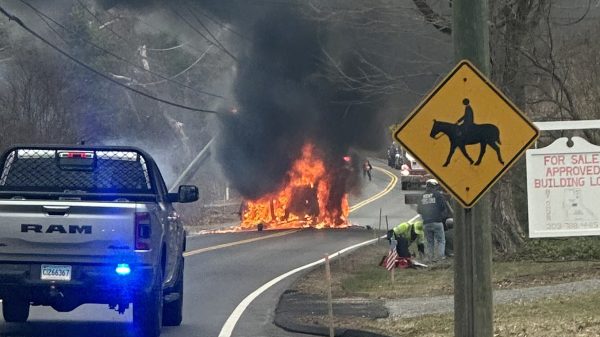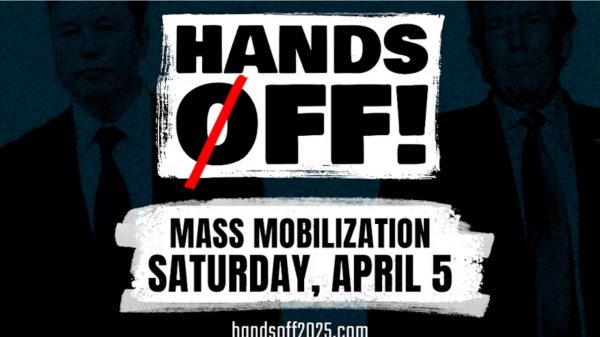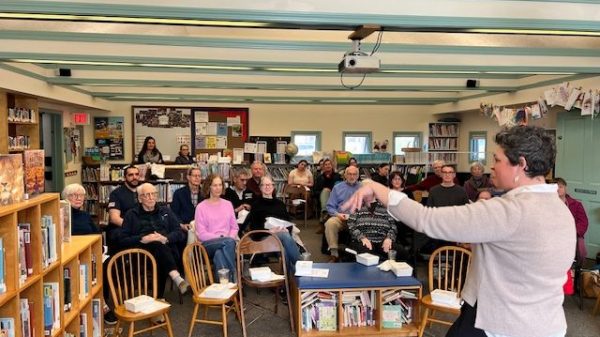This article is part of U.S. Democracy Day, a nationwide collaborative on Sept. 15, the International Day of Democracy, in which news organizations cover how democracy works and the threats it faces. To learn more, visit usdemocracyday.org.

KENT—The kerfuffle over the display of political signs is over.
The local zoning regulation dictating how long they can be displayed—30 days—is in error, according to land use attorney Michael Zika, and will be corrected in coming months.
Zoning Enforcement Officer Tai Kern said the commission received a legal opinion from Zizka, who said that political placards would almost assuredly be considered “content based” and the PZC’s regulation restricting their display to 30 days would have to pass strict scrutiny in court.
“We had a bit of an uprising over political signs, so we checked with Mike Zizka, who did not feel good about the regulation that is in place,” Kern reported. “A land use attorney rarely tells an enforcement officer not to enforce.”
She said the same opinion had been given in 2014 and 2018, but that when the zoning regulations were rewritten by the PZC in 2018, the reference to political signs had been overlooked.
“Zoning officers are always taught that they are not supposed to touch political signs, but somehow the regulation strayed from that,” she said. “No one should be concerned about their political signs.”
The issue arose when new PZC member Chris Harrington posted a message on Facebook saying that political signs could only be displayed for one month.
Scott Trabucco and Tom Ryan were quick to write the Planning and Zoning Commission complaining about the ad hoc statement on the Kent Community Facebook page.
“Recently a Planning and Zoning commissioner has been asserting on the Kent Community Page that leaving campaign signs up for more than 30 days is a violation of law. This to me seems like a serious infringement on our fundamental right to free expression,” said Trabucco.
He asked the full P&Z board to address this issue publicly at its Sept.12 meeting so that there is no confusion.
“If the commissioner was speaking on behalf of the Town and is correct about the time limit imposed by the Town, I would like the commission to clarify what the enforcement mechanism is and how the town will fairly keep track of how long every single town resident has had a political sign up,” he wrote.
“It seems to me like this would be impossible to defend in court and is opening the town up to an expensive lawsuit,” Trabucco continued.
“Our right to free speech and free expression is obviously an extremely important one and we deserve to have town boards and commissions that properly respect those rights and provide truthful information,” he concluded.
Ryan proposed that the commission turn its attention to the underlying problem—the erroneous regulation.
“This regulation is almost certainly unconstitutional and, even in the unlikely circumstance that it could be found to pass constitutional muster, it’s totally unenforceable,” he argued.
“Worse, simply having this regulation on our books could make the town an easy target for an embarrassing and costly lawsuit,” he said. “It should be removed from our books immediately or at least modified to make it clear that political signs are not included.”
He urged town officials to be more careful in distinguishing their privately protected speech from public action.
“While public employees and officials are allowed under the First Amendment to express their own beliefs, these expressions must pass tests to determine whether they are private speech or assertions of public authority (Garcetti v. Caballos 547 U.S. 410 (2006), Lindke v. Freed 601 U.S. 187 (2024),” he wrote.
“In this case, having a person serving on the P&Z Commission citing Planning and Zoning regulations, while ordering their fellow citizens to remove their constitutionally protected signs per those regulations, creates a risk for the Town,” he stated.
He argued that the statement might be considered private speech, “but I think it more likely that this would be seen as government action,” he argued.
“Stating that people’s signs ‘will need to be taken down’ is a far cry from expressing dismay at the proliferation of political signs,” he continued. “It’s certainly dancing on the edge in a way that should be extremely uncomfortable for the Town of Kent.”
Zizka agreed. In a memo to Kern, he said that sign regulations deemed to be “content-based” must demonstrate a “compelling interest to justify the regulations and that regulation must go no further than necessary to limit speech.” He said a decision in 2014 “significantly amped up” the court’s antipathy toward sign regulations.
In 2014, he had written to then-ZEO Donna Hayes that “regulations on political speech are particularly suspect,” and would make it “very difficult to get a court to agree that a regulation on political signs was not ‘content based.’”
He found the 30-day restriction on such signs “problematic,” explaining that not every political sign involves an election.
“For an example,” he wrote, “a person might want to erect a sign saying that taxes are too high in Kent and the selectmen are at fault. There is no ‘event’ by which to gauge compliance.”
He noted that other temporary signs are allowed to be displayed for 45 days with no reference to content.
“Effectively, the regulations appear to favor nonpolitical temporary signs over political signs,” he wrote. Some organizations are periodically going around Connecticut challenging towns on their sign regulations. “Kent might be ripe for one of those challenges,” he cautioned.
He said many content-based signs—real estate, special event, no trespassing signs and the like, all of which can be displayed for 45 days—are treated better than political signs in Kent’s regulations.
“It is difficult for me to recommend to a commission that they decline to enforce certain of their regulations, but I do think the political sign regulations is very problematic,” he said, adding that he sees no “winning strategy” for the town regulation.
Indeed, the U.S. Supreme Court ruled as long ago as 1994 that the display of political and other types of signs on residential property is a unique, important, and protected means of communication and towns cannot restrict the display of such signs. Signs are subject to municipalities’ police powers, but the court warned that they affect communication and towns cannot be over-broad in their restrictions on free speech.
Connecticut has no overall state statute prohibiting placing posters on public property, but does prohibit it for certain types of public property, such as telegraph, telephone, electric light or power poles, trees, shrubs, rocks or other natural objects in any public way or grounds. Given this provision, the Kent Garden Club weighed in with its own plea:
“To all of our friends and neighbors putting out signs, political and otherwise: please do not stick signs into the mulched areas around the four “Kent Welcomes You” signs on routes 7 and 341.
The Kent Garden Club has daffodil bulbs planted there, and when you stick wires into them, they rot instead of producing the flowers we enjoy seeing in the spring,” it implored.




































